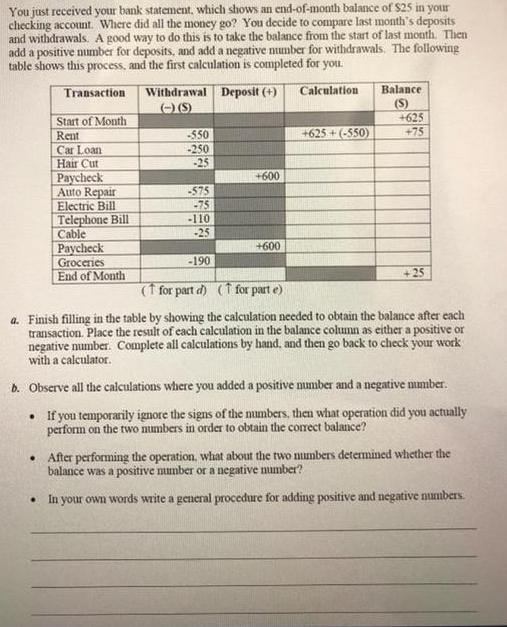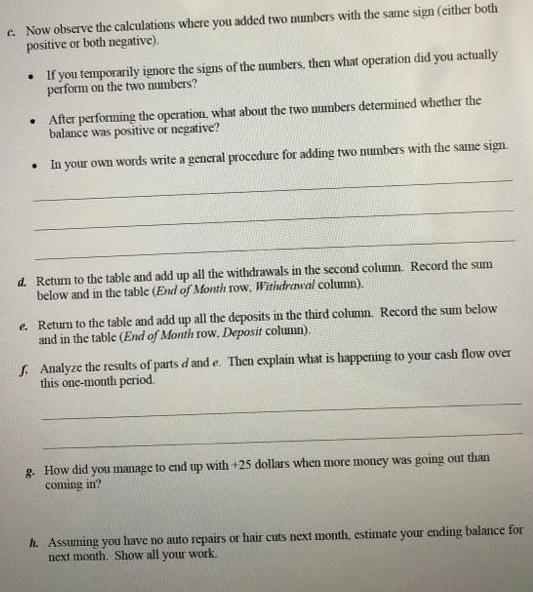Answered step by step
Verified Expert Solution
Question
1 Approved Answer
You just received your bank statement, which shows an end-of-month balance of $25 in your checking account. Where did all the money go? You


You just received your bank statement, which shows an end-of-month balance of $25 in your checking account. Where did all the money go? You decide to compare last month's deposits and withdrawals. A good way to do this is to take the balance from the start of last month. Then add a positive number for deposits, and add a negative number for withdrawals. The following table shows this process, and the first calculation is completed for you. Transaction Calculation Start of Month Rent Car Loan Hair Cut Paycheck Auto Repair Electric Bill Telephone Bill Cable Paycheck Groceries End of Month . Withdrawal Deposit (+) (O)O -550 -250 -25 -575 -75 -110 -25 -190 +600 +600 +625+(-550) Balance (S) +625 +75 25 ( for part d) (1 for parte) a. Finish filling in the table by showing the calculation needed to obtain the balance after each transaction. Place the result of each calculation in the balance column as either a positive or negative number. Complete all calculations by hand, and then go back to check your work with a calculator. b. Observe all the calculations where you added a positive number and a negative number. If you temporarily ignore the signs of the numbers, then what operation did you actually perform on the two numbers in order to obtain the correct balance? After performing the operation, what about the two numbers determined whether the balance was a positive number or a negative number? In your own words write a general procedure for adding positive and negative numbers. c. Now observe the calculations where you added two numbers with the same sign (either both positive or both negative). If you temporarily ignore the signs of the numbers, then what operation did you actually perform on the two numbers? After performing the operation, what about the two numbers determined whether the balance was positive or negative? . In your own words write a general procedure for adding two numbers with the same sign. d. Return to the table and add up all the withdrawals in the second column. Record the sum below and in the table (End of Month row. Withdrawal column). e. Return to the table and add up all the deposits in the third column. Record the sum below and in the table (End of Month row, Deposit column). . Analyze the results of parts d and e. Then explain what is happening to your cash flow over this one-month period. g. How did you manage to end up with +25 dollars when more money was going out than coming in? h. Assuming you have no auto repairs or hair cuts next month, estimate your ending balance for next month. Show all your work.
Step by Step Solution
★★★★★
3.41 Rating (157 Votes )
There are 3 Steps involved in it
Step: 1
a Here is the completed table with the calculations Transaction Withdrawal Deposit Calculation Balance S Start of Month 550 4625 4625 4625 Rent 250 62...
Get Instant Access to Expert-Tailored Solutions
See step-by-step solutions with expert insights and AI powered tools for academic success
Step: 2

Step: 3

Ace Your Homework with AI
Get the answers you need in no time with our AI-driven, step-by-step assistance
Get Started


